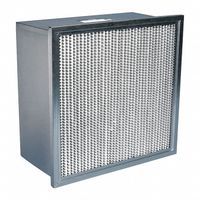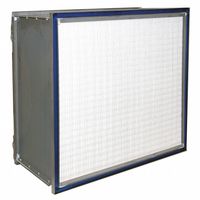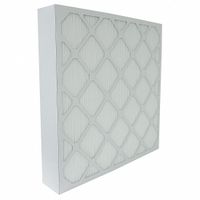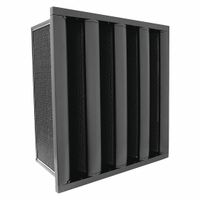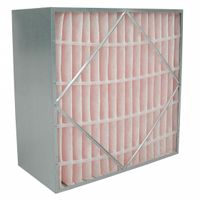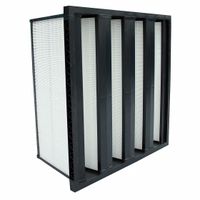Call +(254) 703 030 000 / 751 483 999 / 721 704 777
- Home
- Hvac And Refrigeration
- Air Filters
- Box Air Filters
.....Read More
Frequently Asked Questions
What is the difference between box air filters and panel filters?
Box air filters and panel filters are both used in HVAC systems to remove contaminants from the air, but they differ in design, construction, and application.
Box Air Filters:
1. **Design**: Box air filters are typically cube or rectangular-shaped, with a deep pleated design. They have a larger surface area due to the pleats, which allows for more efficient filtration and longer service life.
2. **Construction**: They are often made with a sturdy frame, usually metal or heavy-duty cardboard, and contain multiple layers of filtration media. The pleats are held in place by a wire mesh or similar support structure.
3. **Efficiency**: Box filters generally offer higher filtration efficiency and can capture smaller particles, making them suitable for environments requiring high air quality, such as hospitals or clean rooms.
4. **Applications**: They are commonly used in commercial and industrial HVAC systems where high airflow and efficiency are required.
Panel Filters:
1. **Design**: Panel filters are flat and typically have a lower profile compared to box filters. They are often made with a single layer of filtration media.
2. **Construction**: These filters are usually framed with cardboard or metal and have a simpler design without pleats, which limits their surface area and filtration capacity.
3. **Efficiency**: Panel filters are generally less efficient than box filters and are designed to capture larger particles like dust and debris. They are often used as pre-filters to extend the life of more efficient filters.
4. **Applications**: They are commonly used in residential HVAC systems and in applications where cost is a concern and high filtration efficiency is not critical.
In summary, box air filters are more efficient and suitable for high-demand applications, while panel filters are cost-effective and used for basic filtration needs.
How often should box air filters be replaced?
Box air filters should generally be replaced every 1 to 3 months. The exact frequency depends on several factors:
1. **Type of Filter**: Higher efficiency filters, such as HEPA filters, may last longer than standard fiberglass filters.
2. **Usage**: If the HVAC system is used frequently, such as in extreme weather conditions, the filter may need to be replaced more often.
3. **Air Quality**: Homes in areas with high pollution or dust levels may require more frequent filter changes.
4. **Presence of Pets**: Homes with pets may need more frequent changes due to pet hair and dander.
5. **Allergies**: If household members have allergies, more frequent changes can help maintain better air quality.
6. **Manufacturer's Recommendations**: Always check the manufacturer's guidelines for specific recommendations.
Regularly checking the filter for visible dirt and dust can also help determine when a replacement is necessary.
What are the benefits of using box air filters in HVAC systems?
Box air filters in HVAC systems offer several benefits:
1. **Improved Air Quality**: Box air filters effectively capture dust, pollen, mold spores, and other airborne particles, enhancing indoor air quality and reducing allergens.
2. **Enhanced System Efficiency**: By trapping contaminants, these filters prevent the buildup of debris on HVAC components, ensuring the system operates efficiently and reducing energy consumption.
3. **Extended Equipment Lifespan**: Cleaner air reduces wear and tear on HVAC components, potentially extending the lifespan of the system and minimizing maintenance costs.
4. **Versatility**: Available in various sizes and materials, box air filters can be tailored to specific HVAC systems and environmental needs, providing flexibility in application.
5. **Cost-Effectiveness**: While initial costs may vary, the long-term savings from improved efficiency and reduced maintenance can make box air filters a cost-effective choice.
6. **Easy Installation and Replacement**: Box air filters are designed for straightforward installation and replacement, simplifying maintenance routines and ensuring consistent performance.
7. **Noise Reduction**: By maintaining clean airflow, these filters can help reduce noise levels associated with HVAC operation, contributing to a quieter indoor environment.
8. **Compliance with Standards**: Many box air filters meet industry standards for air filtration, ensuring they provide reliable performance and contribute to regulatory compliance.
9. **Protection Against Contaminants**: They offer a barrier against larger particles and some microorganisms, contributing to a healthier indoor environment.
10. **Customizable Filtration Levels**: With options ranging from basic to high-efficiency particulate air (HEPA) filters, users can select the appropriate level of filtration for their specific needs.
Overall, box air filters are a crucial component in maintaining the performance and longevity of HVAC systems while ensuring a healthier indoor environment.
How do I choose the right box air filter for my HVAC system?
To choose the right box air filter for your HVAC system, consider the following factors:
1. **Filter Size**: Check your HVAC system's manual or the existing filter for the correct dimensions. Common sizes are 16x20x1, 20x25x1, etc.
2. **MERV Rating**: Minimum Efficiency Reporting Value (MERV) rates filter efficiency. For residential use, a MERV rating between 8 and 13 is recommended. Higher ratings capture more particles but may restrict airflow.
3. **Filter Type**:
- **Fiberglass Filters**: Inexpensive, low MERV, suitable for basic protection.
- **Pleated Filters**: Higher MERV, better at capturing dust and allergens.
- **HEPA Filters**: High efficiency, captures 99.97% of particles, but may require system modifications.
- **Electrostatic Filters**: Use static electricity to capture particles, reusable, and washable.
4. **Air Quality Needs**: Consider household needs such as allergies, pets, or smokers. Higher MERV filters are better for capturing allergens and smoke particles.
5. **System Compatibility**: Ensure the filter is compatible with your HVAC system. High-efficiency filters can strain some systems, reducing efficiency and lifespan.
6. **Budget**: Balance cost with performance. Higher MERV filters are more expensive but offer better air quality.
7. **Replacement Frequency**: Check how often the filter needs replacing. Some filters last 1-3 months, while others can last up to a year.
8. **Brand and Reviews**: Consider reputable brands and read customer reviews for performance insights.
9. **Environmental Impact**: Consider eco-friendly options if sustainability is a priority.
By evaluating these factors, you can select a filter that balances air quality, system efficiency, and cost, ensuring optimal performance for your HVAC system.
Can box air filters improve indoor air quality?
Yes, box air filters can improve indoor air quality. These filters are designed to capture airborne particles such as dust, pollen, pet dander, and even some bacteria and viruses, depending on their efficiency rating. By removing these contaminants from the air, box air filters can help reduce allergy symptoms, asthma triggers, and other respiratory issues.
Box air filters are typically rated using the Minimum Efficiency Reporting Value (MERV) scale, which ranges from 1 to 16. Higher MERV ratings indicate a greater ability to capture smaller particles. For residential use, a MERV rating between 8 and 13 is generally recommended, as it balances efficiency with airflow. Filters with higher MERV ratings, such as HEPA filters, can capture even smaller particles, including some bacteria and viruses, but may require more powerful fans to maintain airflow.
In addition to particle removal, some box air filters are treated with activated carbon or other materials to reduce odors and volatile organic compounds (VOCs), further enhancing indoor air quality. However, it's important to regularly replace or clean these filters according to the manufacturer's instructions to maintain their effectiveness.
While box air filters can significantly improve indoor air quality, they are most effective when used as part of a comprehensive approach to air quality management. This includes regular cleaning, controlling humidity levels, and ensuring proper ventilation. Additionally, addressing specific sources of indoor pollution, such as smoking or the use of certain household products, can further enhance the benefits of using box air filters.
Overall, box air filters are a practical and effective tool for improving indoor air quality, contributing to a healthier and more comfortable living environment.
Are box air filters suitable for residential use?
Yes, box air filters are suitable for residential use. They are designed to fit into HVAC systems and are effective in improving indoor air quality by trapping airborne particles such as dust, pollen, pet dander, and mold spores. Box air filters come in various sizes and MERV (Minimum Efficiency Reporting Value) ratings, which indicate their ability to capture particles of different sizes. For residential use, a MERV rating between 8 and 13 is typically recommended, balancing efficiency and airflow.
These filters are easy to install and replace, making them a convenient option for homeowners. They help maintain the efficiency of HVAC systems by preventing dust and debris from accumulating on the system's components, which can lead to reduced performance and increased energy consumption. Regular replacement of box air filters is essential to ensure optimal performance and air quality.
Box air filters are available in different materials, such as fiberglass, pleated paper, or synthetic fibers. Pleated filters are generally more efficient than fiberglass filters due to their larger surface area, which allows them to capture more particles without restricting airflow.
While box air filters are effective for general air purification, they may not be sufficient for homes with specific air quality concerns, such as high levels of allergens or pollutants. In such cases, additional air purification systems, like HEPA filters or air purifiers, may be necessary.
Overall, box air filters are a practical and cost-effective solution for improving indoor air quality in residential settings, provided they are chosen with the appropriate MERV rating and replaced regularly.
What are the different types of box air filters available?
#NAME?
